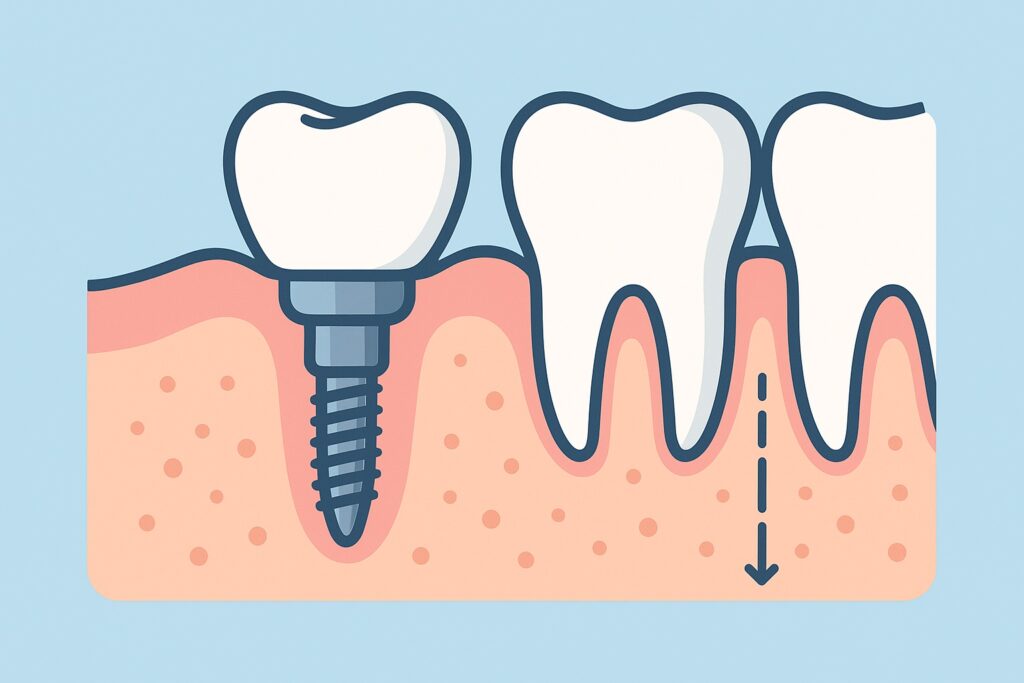Mini dental implants have become a popular solution for patients who need tooth replacement but want a less invasive and more affordable option than traditional implants. Whether used to support dentures or replace a single tooth in a narrow space, these implants offer real benefits — but they also come with limitations. One of the most common questions patients ask is: How long do mini dental implants actually last? Understanding the lifespan of mini dental implants can help set realistic expectations, guide aftercare habits, and help you decide if they’re the right long-term solution for your dental needs.
What Are Mini Dental Implants?
Mini dental implants are small, narrow-diameter titanium posts designed to replace missing teeth or stabilize dentures. They function similarly to traditional implants but are much thinner — usually less than 3 mm in diameter — and are often placed without the need for extensive surgery.
Unlike standard implants, which consist of two parts (the post and the abutment), mini dental implants are a one-piece unit with a ball-shaped head that protrudes above the gumline. This simplified design allows for quicker placement, often in a single visit, and minimal healing time.
Dentists commonly recommend mini implants in the following cases:
- When there’s insufficient bone width for full-sized implants
- For stabilizing lower dentures
- To replace small teeth like incisors or premolars
- When a patient can’t undergo more invasive surgery due to medical conditions or cost
While mini implants provide a strong and functional solution, they aren’t suitable for all patients, particularly in areas where bite force is high or where bone density is significantly compromised.
Average Lifespan of Mini Dental Implants
Mini dental implants typically last 6 to 10 years, though many patients experience longer durability with proper care. Their lifespan largely depends on where they’re placed, how well they’re maintained, and individual health factors.
In lower-pressure areas, like the front of the lower jaw, mini implants can remain stable and functional for over a decade. However, in high-bite-force zones, such as the molar region, they may wear down or fail sooner due to their smaller size and lower structural strength compared to traditional implants.
Situations where they may last longer:
- Good bone support at the time of placement
- Excellent oral hygiene and non-smoking lifestyle
- Low-stress applications like denture stabilization
Situations where they might fail earlier:
- Poor bone density or bone loss over time
- High bite pressure from grinding or clenching
- Smoking, uncontrolled diabetes, or poor dental hygiene habits
While mini implants aren’t generally considered as permanent as standard implants, many patients report 10+ years of functionality with proper follow-up care.
Key Factors That Affect Longevity
The lifespan of mini dental implants isn’t fixed — it varies based on a range of patient-specific and clinical factors. Understanding what impacts their durability can help you take steps to extend their usefulness.
Bone Density and Quality
Successful implant placement depends heavily on the quality of the bone. Mini implants require sufficient bone to grip onto, and because they are thinner, they have less surface area for integration. If bone density is low or deteriorates over time, the implant’s stability can be compromised.
Oral Hygiene Habits
Daily brushing, flossing, and use of antibacterial rinses help prevent gum disease and bone loss, both of which can shorten the life of mini implants. Poor hygiene can lead to peri-implantitis — an infection around the implant — which may cause it to fail prematurely.
Smoking and Lifestyle Choices
Smoking reduces blood flow in the gums, slows healing, and increases the risk of infection. It’s a major contributor to implant failure. Similarly, uncontrolled diabetes and high sugar diets can lead to complications affecting implant longevity.
Placement Technique and Dentist’s Experience
The skill of the dentist plays a critical role. Proper angling, depth, and placement technique are essential for long-term success. An experienced practitioner will also know when mini implants are not advisable and recommend alternatives if needed.
Regular Dental Checkups
Routine dental visits allow your dentist to monitor the health of your implants, check for signs of bone loss or wear, and perform professional cleanings. Early detection of issues can often prevent premature failure.
How to Make Mini Dental Implants Last Longer
While mini dental implants have a slightly shorter average lifespan than traditional implants, proper care can significantly extend their longevity. Here’s how to keep them functioning well for as long as possible.
Maintain Consistent Oral Hygiene
Brush twice daily using a soft-bristle toothbrush and non-abrasive toothpaste. Floss gently around the implant area and consider using interdental brushes or water flossers for hard-to-reach spaces. Bacteria buildup can lead to infection and bone loss, so daily cleaning is essential.
Use Antibacterial Rinses
Rinsing with a dentist-approved antibacterial mouthwash can help control plaque and reduce inflammation around the gums. This supports the health of both natural teeth and implants.
Avoid Hard Foods and Bad Habits
Chewing on ice, pens, or other hard objects can put unnecessary stress on mini implants, especially in molar regions. Also avoid clenching or grinding your teeth — if you grind at night, talk to your dentist about a nightguard.
Stop Smoking
Smoking drastically reduces implant success rates. Quitting improves blood flow, enhances healing, and decreases the risk of infection and bone loss around the implant.
Schedule Regular Dental Visits
Routine cleanings and checkups — at least twice a year — allow your dentist to monitor the implant site, remove plaque buildup, and identify early signs of trouble. Professional maintenance is critical for long-term implant stability.
Are Mini Dental Implants Right for You?
Mini dental implants can be a highly effective solution, but they’re not ideal for every patient. Understanding whether they’re the right fit depends on your oral health, bone structure, and long-term dental goals.
Ideal Candidates for Mini Dental Implants
- Patients with limited bone volume who can’t support traditional implants
- Individuals seeking a less invasive, more affordable tooth replacement
- Denture wearers looking for more stability without extensive surgery
- People with health conditions that prevent them from undergoing longer implant procedures
If you fall into one of these categories, mini implants might be an excellent choice — especially for stabilizing lower dentures or replacing small teeth in tight spaces.
Limitations to Consider
Mini implants aren’t as strong as traditional implants, and they may not handle heavy bite forces as effectively. They’re generally not recommended for replacing large molars or for people with severe bruxism (teeth grinding). Additionally, they may not last as long in cases where bone quality is compromised or ongoing gum disease is present.
When to Consider Full-Size Implants Instead
If you have sufficient bone structure, are in good health, and want a longer-lasting, more durable solution — especially in high-stress areas — full-size implants may be the better option. They offer more stability, can support a wider range of restorations, and tend to have a higher long-term success rate.
Ultimately, your dentist will help you weigh the pros and cons based on a thorough evaluation, imaging, and your specific treatment goals.
Conclusion
Mini dental implants offer a practical and minimally invasive solution for many patients needing tooth replacement or denture stabilization. While they typically last between 6 to 10 years, their longevity can be significantly extended with proper care, good oral hygiene, and regular dental checkups. Factors like bone density, smoking, and placement technique all influence how long they last.
They’re not the right option for everyone — but for the right candidate, mini implants can deliver years of comfort and function at a lower cost than traditional alternatives. If you’re considering mini implants, speak with your dentist about your specific oral health condition and long-term expectations to make the most informed decision.

